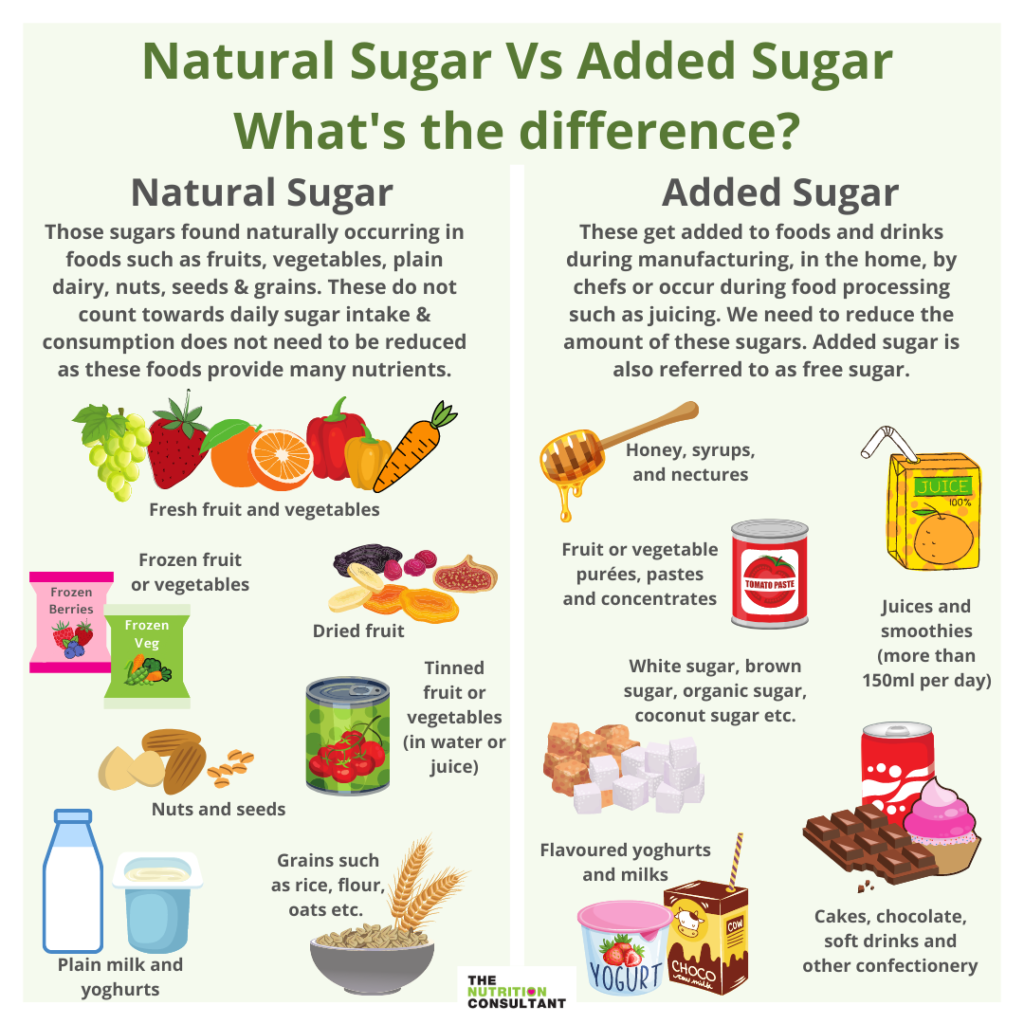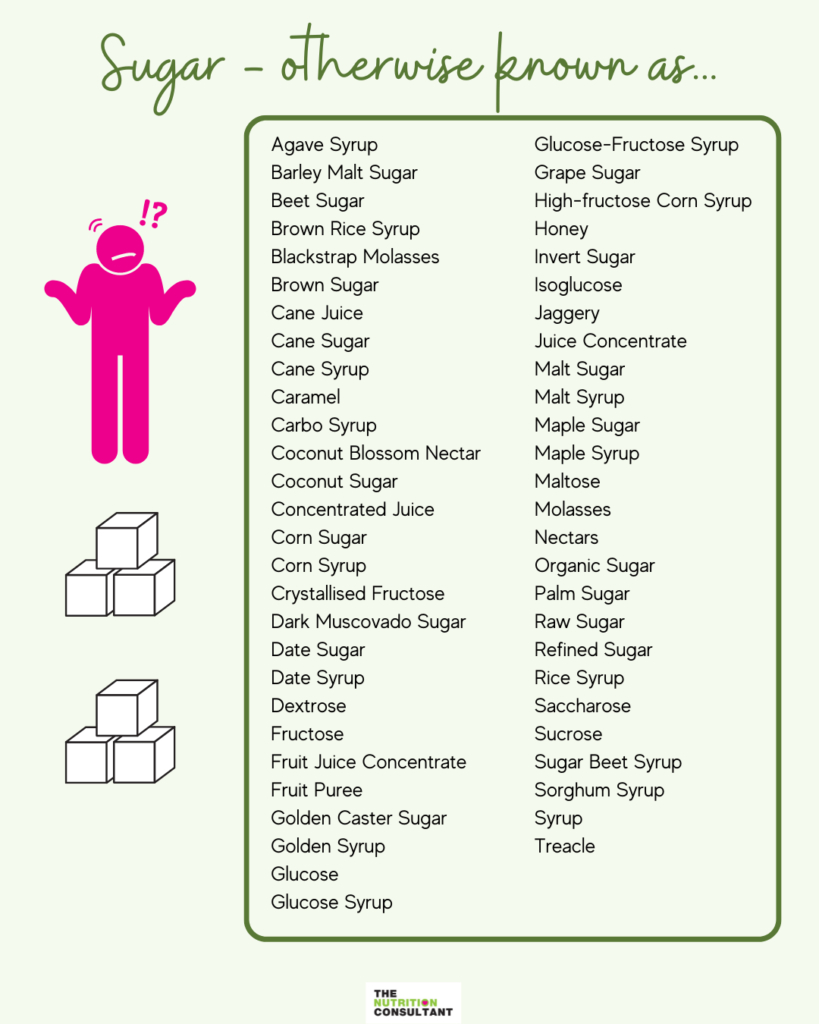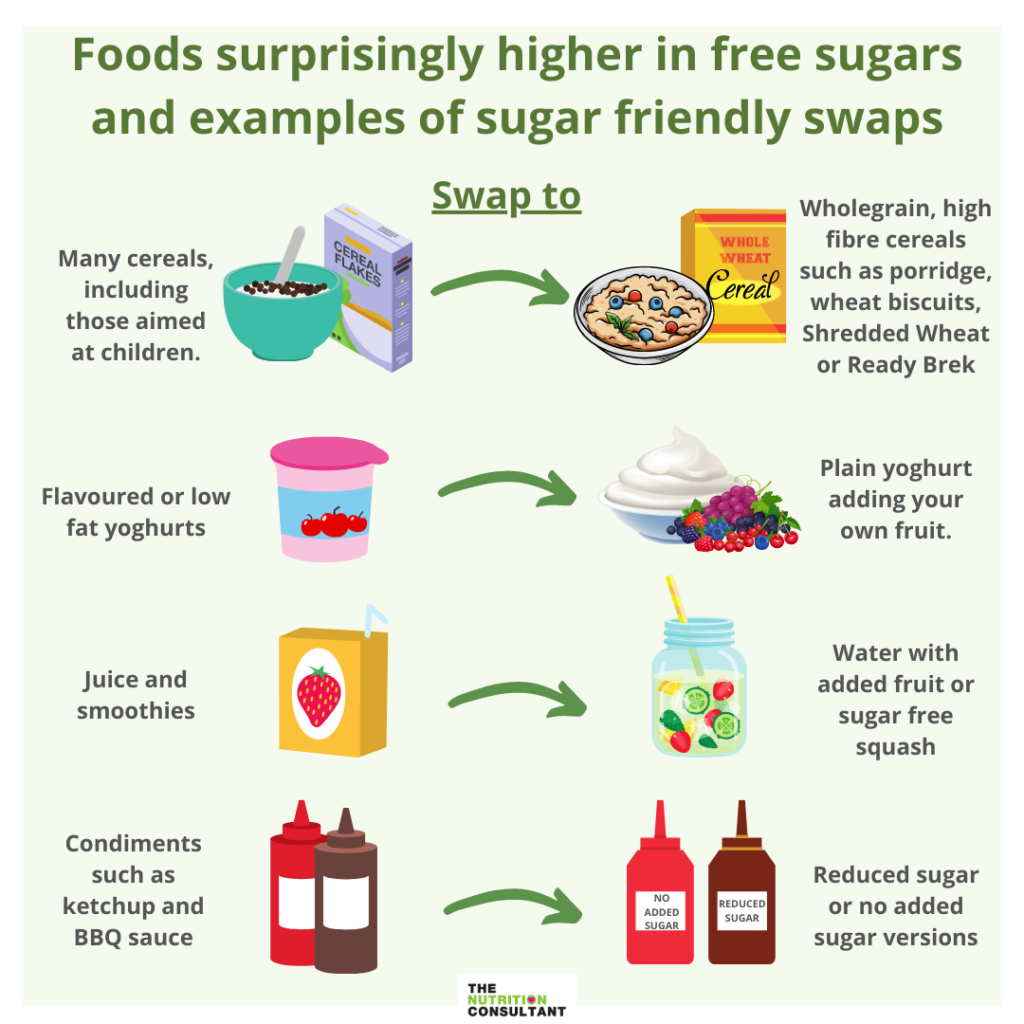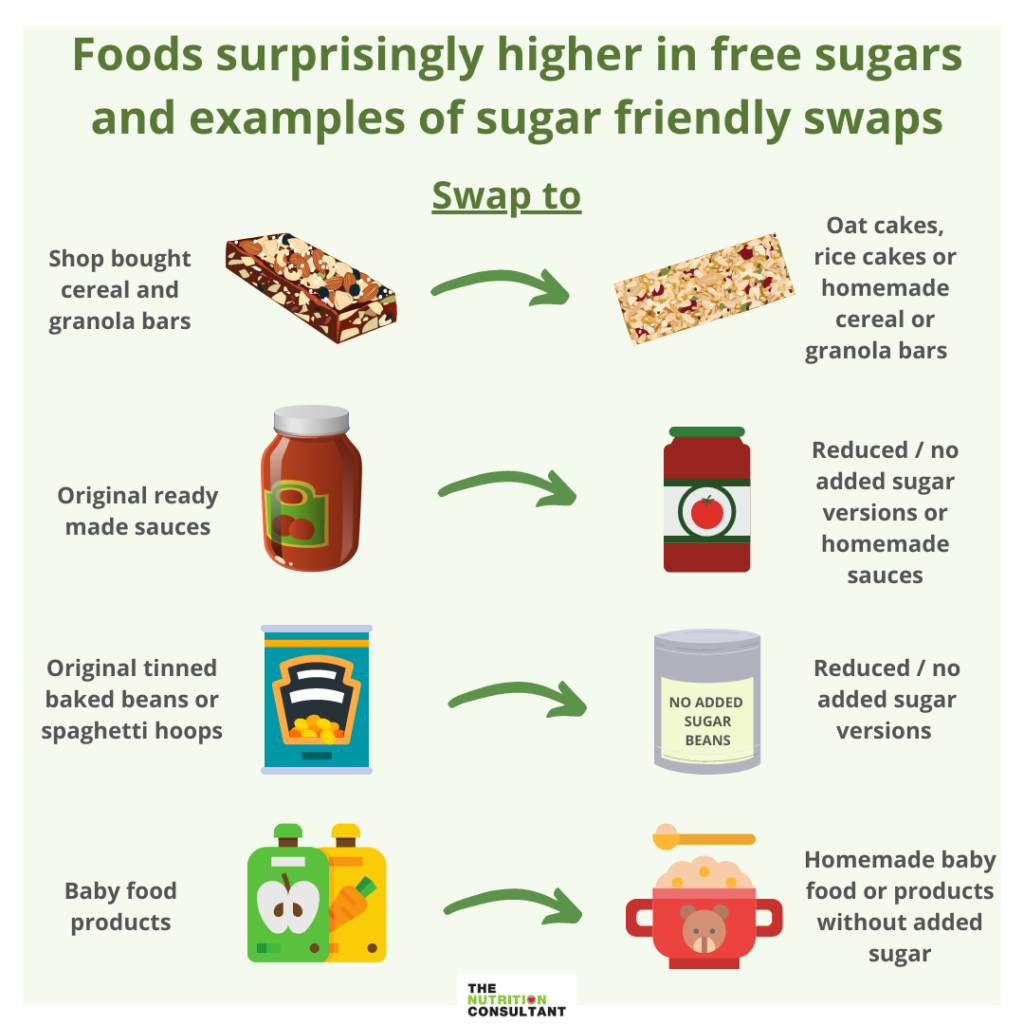A Nutritionist’s Guide to Sugar
Are some sugars healthier than others? Or should we be avoiding them altogether? These are some of the most common questions I get asked as a nutritionist, so I’ve put together this mini guide to give you the lowdown on sugar!
Types of sugar
When we talk about the impact that sugar has on our health, it’s important to bear in mind that there are different types.
‘Natural sugars’ are the sugars found naturally in foods such as fruits, veg, plain dairy, nuts, seeds and grains. These foods provide many nutrients and don’t have as big of an impact on our blood sugar, so in general, their consumption does not need to be a concern.
‘Free sugars’ are the sugars added to foods and drinks during manufacturing or cooking, or they are created as a result of food processing. This is the type that we shouldn’t consume too much of as it can have a detrimental impact when consumed in excess (though they can definitely be had as a part of a healthy balanced diet).
Here is a breakdown of what foods are classed as ‘natural’ and ‘free’ sugars:

There is often a lot of confusion around what counts as a ‘natural sugar’, as many brands will use claims like ‘100% natural’ to describe a product that doesn’t contain any added sugars. However, just because a food or drink says it contains ‘no added sugar’ or ‘only natural sugars’ doesn’t mean that it contains no ‘free’ sugars. To minimise confusion, here’s my list of ‘free sugars’ to look out for on food packaging:

Why Aren’t Fruit Juice and Maple Syrup Classed as ‘Natural Sugars’?
Fruit juice and honey are listed as ‘free sugar’ because of the processing involved in creating them.
When fruit juice is processed, most of the fibre and nutrients are lost and the sugars become “free” (released from their cell structure and swirl around the liquid). As a result, it’s much easier to consume more sugar than you would if you were to eat the fruit in its whole form. But this doesn’t mean you shouldn’t have juice at all, it’s just important to be aware that there is a limit to the “goodness” it provides.
Some people have asked me if maple syrup is a better sweetener in foods because it contains additional nutrients that regular table sugar doesn’t. Whilst this is technically true, you would still have to consume excessive quantities to get any nutritional benefit – so the cons outweigh the pros here in terms of health benefits.
If you’re still confused by the difference between ‘free’ and ‘natural’ sugars, I recommend watching this reel for a visual explanation.
Why Should We Reduce Free Sugars?
Now that I’ve cleared up what sugars we should be watching out for, let’s dive into the why.
One of the biggest concerns with eating too much free sugar is the impact it has on our dental health, as a high intake has been associated with an increased risk of tooth decay (Moynihan and Kelly, 2014).
Worryingly, research by Public Health England found that almost a quarter of children in England experience some obvious tooth decay by the age of 5. In addition, the proportion of 5-year-olds who have undergone tooth extraction (often under general anesthetic in hospital) is around 2.4%. This is shocking, especially as tooth decay is largely preventable.
As well as oral health problems, excessive intake of free sugars can lead to an overconsumption of calories, which can increase the risk of weight gain and other health problems later in life, such as type 2 diabetes (Te Morenga et al, 2013).
How Much Free Sugar Should We Be Eating?
These are the current free sugar recommendations for different age groups within the UK:
| AGE | FREE SUGAR RECOMMENDATIONS |
|---|---|
| <4 years | No set guidelines, but recommended to avoid added sugar where possible |
| 4-6 years | No more than 19g sugar per day (equivalent to 5 sugar cubes) |
| 7-10 years | No more than 24g per day (equivalent to 6 sugar cubes) |
| 11+ years | No more than 30g per day (equivalent to 7 sugar cubes) |
As a nation, we consume well over this recommended intake of free sugars (especially children). According to data from the recent National Diet and Nutrition Survey, the current intake of free sugars in the UK is as follows:
- Children aged 1.5-3years: 27.9g/day
- Children aged 4-10years: 47.3g/day
- Children aged 11-18years: 54.9g/day
- Adults aged 19-64years: 49.7g/day
- Adults aged 65 years and over: 42.1g/day
How to Reduce Free Sugars In Your Diet
Before I get into my top tips I want to highlight that it’s virtually impossible to have a healthy diet without consuming some free sugars. Whilst it’s clear that we need to reduce our free sugar intake, it shouldn’t be vilified as much as it is and we don’t need to cut it out completely.
Sugar is found in a wide variety of everyday products and often has a very good reason for being there. It can also make food and drink taste great, which isn’t a bad thing when we want a sweet treat. So bear this in mind before attempting a completely sugar-free diet!
Keeping your free sugar intake below the recommendations can be tricky, but it’s not impossible. Sometimes all you need to do is make a few small tweaks to what you and your children eat.
Here are my top tips:
- Choose reduced/lower sugar alternatives in the supermarket (such as baked beans, sauces, yoghurts and plant-based milk alternatives).
- Swap some of your high-sugar snacks for fruit. Think about how you can ADD some variety to your diet. What can you add in that is nutrient-rich and low in added sugars, without cutting out your favourite snacks altogether?
- Have sweet foods like chocolate, cakes and biscuits in moderation. If you cut them out completely you’ll probably find yourself craving them and eventually ‘giving in’ (which can often result in feelings of guilt). But the thing is, you CAN eat these foods! It’s just a good idea to have them in moderation as they can be high in sugar.
- Check food labels in the supermarket and compare your go-to products with other options. Choosing low (and medium) sugar products most of the time will help reduce your sugar consumption.
Something is LOW in sugar if it:
– Has a green traffic light label
– Has 5g or less sugar / 100g
– Has 2.5g or less sugar / 100ml


5 Sugar Myths That Might Surprise You
Myth 1: We should eliminate ALL free sugars from our diet
Whilst excessive consumption of free sugars has been linked to poorer health outcomes, this doesn’t mean that a healthy balanced diet can’t include a chocolate bar or glass of fruit juice every now and then.
Free sugars are in many different foods (even savoury sauces and tinned soups!) so trying to eliminate it completely from your diet could be stressful and greatly limit the foods you can eat.
Instead, try choosing lower sugar options where possible, as this is a far more achievable goal for reducing your overall free sugar consumption.

Myth 2: Sugar is addictive
We are naturally attracted to sweet-tasting foods and can often feel reliant on them (which some people might perceive as an addiction). However, most evidence in this area of research originates from animal-based studies, not human ones!
This means that this research cannot be directly applied to human eating patterns, as we are a lot more complex than animals.
Despite this, changing our relationship with food can be difficult for some people and it can be common to become emotionally attached to food or use it as a coping mechanism.
It’s not impossible to break habits that aren’t benefiting you though. So, please seek help from a health professional should you need it.

Myth 3: We should limit how much fruit we eat because of their sugar content
I’ve already gone into detail about the difference between whole fruit sugars and free sugars, so hopefully you understand why this is a myth!
As a quick reminder: the sugars found in fruit in its whole form act differently within our body compared to free sugars (due to the difference in processing).
And remember – fruit also contains fibre, vitamins, minerals and phytonutrients! So it is an essential part of a healthy balanced diet.

Myth 4: Sugar feeds cancer cells
This is a wide-circulating myth which stems from the fact that cancer cells grow quickly and require lots of glucose to grow. It is often thought that cutting out sugar (glucose) from the diet can stop the growth of cancer cells.
However, this theory completely ignores the complexity of biology!
The healthy cells in our body ALSO require glucose to function and there is no way of specifically supplying healthy cells with glucose, whilst restricting it from cancer cells.
Restricting sugar from your diet by going on a very low carbohydrate diet could do more harm than good, as you are also eliminating healthy benefiting nutrients such as fibre, vitamins and minerals, as well as energy for healthy cells to function.

Myth 5: Honey, maple syrup and agave nectar are healthier than table sugar
Honey, maple syrup and agave nectar have all been branded as “healthy” substitutes for table sugar. However, as I mentioned earlier, these are all still classed as free sugars.
Whilst there might be some extra minerals and antioxidants in these so-called “healthier alternatives”, this is still in very small amounts (you’d have to consume a lot of sugar to get the benefits!).
This isn’t to say you should avoid these foods completely – but just be aware that they are pretty much the same as regular table sugar, just marketed in a more desirable way.

More Sugar Resources:
- Which sugar is better for our health? https://www.instagram.com/p/ClHEubyoeRU/
- Low sugar and salt snacks for younger kids: https://www.instagram.com/p/ClEwFMrIJfN/
- Low sugar breakfast ideas: https://www.instagram.com/p/Ck8LzYto2Gn/
- Should you go sugar-free? https://www.instagram.com/p/ChsETXGIA_O/
References
Moynihan, P.J. and Kelly, S.A.M. (2014). Effect on caries of restricting sugars intake: systematic review to inform WHO guidelines. Journal of dental research, 93(1), pp.8-18.
Public Health England (2018). Oral health survey of 5 year old children: 2017. Available at: https://www.gov.uk/government/statistics/oral-health-survey-of-5-year-old-children-2017 (Accessed: December 2022).
Te Morenga, L., Mallard, S. and Mann, J. (2013). Dietary sugars and body weight: systematic review and meta-analyses of randomised controlled trials and cohort studies. Bmj, 346.
Public Health England (2020). NDNS: results from years 9 to 11 (combined) – data tables. Available at: https://www.gov.uk/government/statistics/ndns-results-from-years-9-to-11-2016-to-2017-and-2018-to-2019 (Accessed: December 2022).









